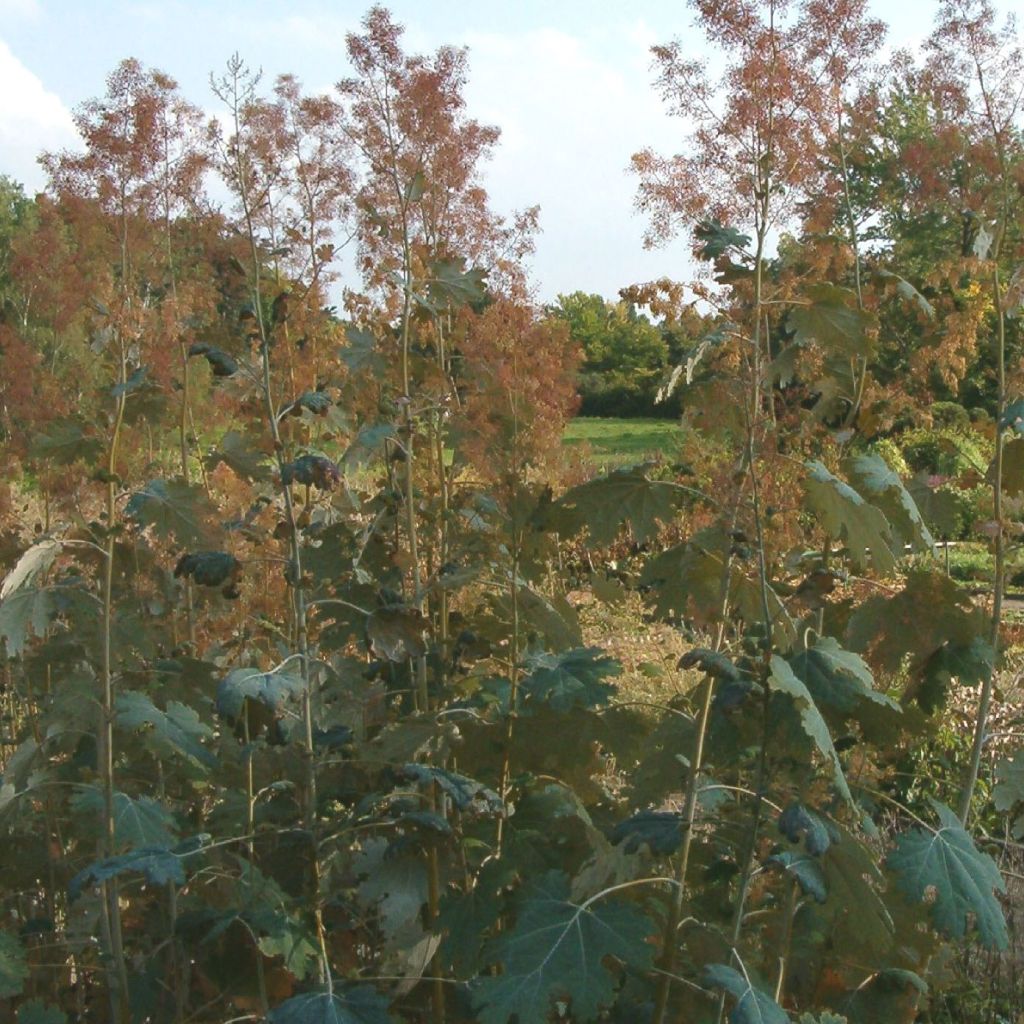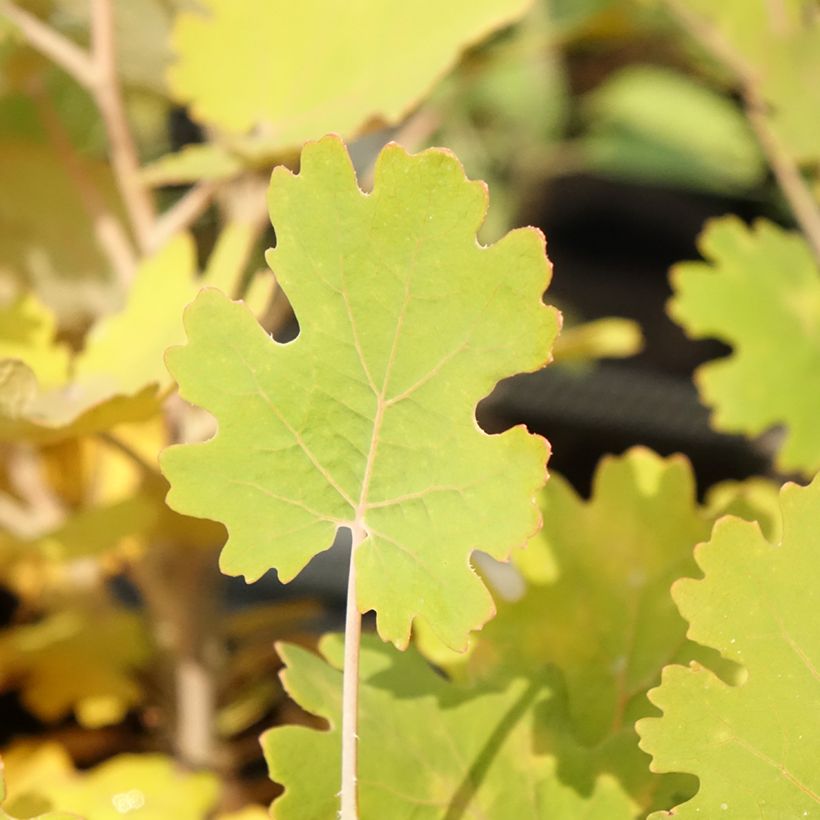

Macleaya microcarpa Kelways Coral Plume
Macleaya microcarpa Kelways Coral Plume
Macleaya microcarpa Kelway's Coral Plume
Plume Poppy
I love its exotic aspect and its impressive midrib combined with beautiful colours.
Jean R., 30/09/2017
Special offer!
Receive a €20 voucher for any order over €90 (excluding delivery costs, credit notes, and plastic-free options)!
1- Add your favorite plants to your cart.
2- Once you have reached €90, confirm your order (you can even choose the delivery date!).
3- As soon as your order is shipped, you will receive an email containing your voucher code, valid for 3 months (90 days).
Your voucher is unique and can only be used once, for any order with a minimum value of €20, excluding delivery costs.
Can be combined with other current offers, non-divisible and non-refundable.
Home or relay delivery (depending on size and destination)
Schedule delivery date,
and select date in basket
This plant carries a 12 months recovery warranty
More information
We guarantee the quality of our plants for a full growing cycle, and will replace at our expense any plant that fails to recover under normal climatic and planting conditions.


Would this plant suit my garden?
Set up your Plantfit profile →
Description
Macleaya microcarpa 'Kelway's Coral Plume', often called plume poppy, is an imposing rhizomatous perennial with a quaint charm that was very popular in the 1900s. Somewhat forgotten since then, it deserves its place in a large garden that allows room for nature. It demonstrates a generous temperament, offering long, soft coral-pink plume-like panicles in summer, which are devilishly romantic. Adorned with its beautiful mane, it gives a taste of autumn to the garden and reveals a soft silver underside beneath its large lobed leaves. Give this robust wild plant space, sunlight, and moist but well-drained soil, so it can fully express itself at the back of a flower bed.
Macleaya microcarpa is a woody-based herbaceous perennial native to China, belonging to the Papaveraceae family. This unlikely cousin of poppies forms an imposing clump exceeding 1m (3ft) in height and width for the foliage, and often reaching 2m (7ft) in height when flowering in our climates. The plant spreads rapidly thanks to its running roots, making it suitable for large spaces. Flowering takes place in summer, in June-July, in the form of large plume-like inflorescences that persist on the plant for a long time. The flowers are tiny but countless, and composed of two sepals forming a calyx of soft coral-pink. The stems, covered with a whitish bloom, contain yellow latex. They bear large alternate leaves, divided into 5 to 7 lobes, with a grey-green to olive-green colour, and a velvety underside of beautiful almond green. They resemble those of annual poppies. The plant readily self-seeds in moist soil, but not always faithfully with respect to the mother plant.
Macleaya microcarpa 'Kelway's Coral Plume' is undoubtedly a beautiful plant. It is majestic, hardy, and sculptural, with a truly unique appearance. This standout variety should, however, be avoided in a small garden. It will inevitably charm in wild areas, sprinkling its tall plumes throughout summer. It can be planted with willowherbs and ferns in moist soil. It pairs well with rodgersias, gunneras, giant hogweed, or angelicas, with which it quickly and dramatically fills a somewhat neglected corner. Note that its inflorescences are magnificent in fresh or dried bouquets, and its tall stems do not need staking.
There has long been confusion between the two species that make up this genus, M. microcarpa often being sold under the name of M. cordata. The difference in appearance mainly lies in the presence of two large whitish sepals on the flower, 2cm (1in) fruit capsules, and a larger size in cordata, which can reach 5 to 6m (16 to 20ft) in height.
Report an error about the product description
Macleaya microcarpa Kelways Coral Plume in pictures


Flowering
Foliage
Plant habit
Botanical data
Macleaya
microcarpa
Kelway's Coral Plume
Papaveraceae
Plume Poppy
Cultivar or hybrid
Planting and care
Macleaya microcarpa thrives in a sunny location sheltered from cold winds, in regular, moist but well-drained soil. It requires space - at least 5 square metres - for it to fully develop, as well as rich and deep soil. This perennial can be susceptible to a fungal infection caused by Erysiphe macleayae, a powdery mildew that covers the leaves with white spots, with its development being favoured in hot and humid conditions. This plant truly shines when isolated, or in the company of other large plants such as giant petasites, Gunnera manicata, and bamboo.
Planting period
Intended location
Care
-
, onOrder confirmed
Reply from on Promesse de fleurs
Haven't found what you were looking for?
Hardiness is the lowest winter temperature a plant can endure without suffering serious damage or even dying. However, hardiness is affected by location (a sheltered area, such as a patio), protection (winter cover) and soil type (hardiness is improved by well-drained soil).

Photo Sharing Terms & Conditions
In order to encourage gardeners to interact and share their experiences, Promesse de fleurs offers various media enabling content to be uploaded onto its Site - in particular via the ‘Photo sharing’ module.
The User agrees to refrain from:
- Posting any content that is illegal, prejudicial, insulting, racist, inciteful to hatred, revisionist, contrary to public decency, that infringes on privacy or on the privacy rights of third parties, in particular the publicity rights of persons and goods, intellectual property rights, or the right to privacy.
- Submitting content on behalf of a third party;
- Impersonate the identity of a third party and/or publish any personal information about a third party;
In general, the User undertakes to refrain from any unethical behaviour.
All Content (in particular text, comments, files, images, photos, videos, creative works, etc.), which may be subject to property or intellectual property rights, image or other private rights, shall remain the property of the User, subject to the limited rights granted by the terms of the licence granted by Promesse de fleurs as stated below. Users are at liberty to publish or not to publish such Content on the Site, notably via the ‘Photo Sharing’ facility, and accept that this Content shall be made public and freely accessible, notably on the Internet.
Users further acknowledge, undertake to have ,and guarantee that they hold all necessary rights and permissions to publish such material on the Site, in particular with regard to the legislation in force pertaining to any privacy, property, intellectual property, image, or contractual rights, or rights of any other nature. By publishing such Content on the Site, Users acknowledge accepting full liability as publishers of the Content within the meaning of the law, and grant Promesse de fleurs, free of charge, an inclusive, worldwide licence for the said Content for the entire duration of its publication, including all reproduction, representation, up/downloading, displaying, performing, transmission, and storage rights.
Users also grant permission for their name to be linked to the Content and accept that this link may not always be made available.
By engaging in posting material, Users consent to their Content becoming automatically accessible on the Internet, in particular on other sites and/or blogs and/or web pages of the Promesse de fleurs site, including in particular social pages and the Promesse de fleurs catalogue.
Users may secure the removal of entrusted content free of charge by issuing a simple request via our contact form.
The flowering period indicated on our website applies to countries and regions located in USDA zone 8 (France, the United Kingdom, Ireland, the Netherlands, etc.)
It will vary according to where you live:
- In zones 9 to 10 (Italy, Spain, Greece, etc.), flowering will occur about 2 to 4 weeks earlier.
- In zones 6 to 7 (Germany, Poland, Slovenia, and lower mountainous regions), flowering will be delayed by 2 to 3 weeks.
- In zone 5 (Central Europe, Scandinavia), blooming will be delayed by 3 to 5 weeks.
In temperate climates, pruning of spring-flowering shrubs (forsythia, spireas, etc.) should be done just after flowering.
Pruning of summer-flowering shrubs (Indian Lilac, Perovskia, etc.) can be done in winter or spring.
In cold regions as well as with frost-sensitive plants, avoid pruning too early when severe frosts may still occur.
The planting period indicated on our website applies to countries and regions located in USDA zone 8 (France, United Kingdom, Ireland, Netherlands).
It will vary according to where you live:
- In Mediterranean zones (Marseille, Madrid, Milan, etc.), autumn and winter are the best planting periods.
- In continental zones (Strasbourg, Munich, Vienna, etc.), delay planting by 2 to 3 weeks in spring and bring it forward by 2 to 4 weeks in autumn.
- In mountainous regions (the Alps, Pyrenees, Carpathians, etc.), it is best to plant in late spring (May-June) or late summer (August-September).
The harvesting period indicated on our website applies to countries and regions in USDA zone 8 (France, England, Ireland, the Netherlands).
In colder areas (Scandinavia, Poland, Austria...) fruit and vegetable harvests are likely to be delayed by 3-4 weeks.
In warmer areas (Italy, Spain, Greece, etc.), harvesting will probably take place earlier, depending on weather conditions.
The sowing periods indicated on our website apply to countries and regions within USDA Zone 8 (France, UK, Ireland, Netherlands).
In colder areas (Scandinavia, Poland, Austria...), delay any outdoor sowing by 3-4 weeks, or sow under glass.
In warmer climes (Italy, Spain, Greece, etc.), bring outdoor sowing forward by a few weeks.

































